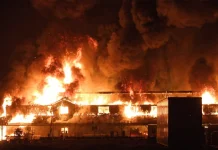A report by Allianz Global Corporate & Specialty has said cyber and political risks and macroeconomic developments will top the three business risks in Nigeria in 2022.
The global group disclosed this in its report titled ‘Allianz Risk Barometer 2022’.
It said, “Cyber, political risks and violence, and macroeconomic developments are the top three Nigerian business risks in 2022.
“Pandemic outbreak drops from first to ninth position as majority of companies are less concerned and feel adequately prepared for future outbreaks. Political risks and violence is still a major concern in Nigeria as it moves from fifth to second.”
The Chief Executive Officer, AGCS, Joachim Mueller, said, “Business interrupted will likely remain the key underlying risk theme for this year. Building resilience is becoming a competitive advantage for companies.”
According to the report, cyber perils are the biggest concern for companies in Nigeria, Africa, the Middle East, South Africa, and worldwide in 2022.
It said the threat of ransomware attacks, data breaches or major IT outages worried companies even more than business and supply chain disruption, natural disasters, or the COVID-19 pandemic, all of which it said had heavily affected firms in the past year.
The report said, “Globally, cyber incidents top the Allianz Risk Barometer for only the second time in the survey’s history (44 percent of responses), business interruption drops to a close second (42 percent) and natural catastrophes ranks third (25 percent), up from sixth in 2021.
“Climate change climbs to its highest-ever ranking of sixth (17 percent, up from ninth), while pandemic outbreak drops to fourth (22 percent).
“The annual survey from Allianz Global Corporate & Specialty incorporates the views of 2,650 experts in 89 countries and territories, including CEOs, risk managers, brokers and insurance experts.”
According to the report, political risks and violence and changes in legislation and regulation are rising concerns for businesses in Nigeria.
It said political risks and violence moved from fifth to second following the #EndSARS protest in 2020, adding that changes in legislation and regulation moved up four places to fourth in the country.
The Head of Global Political Violence and Hostile Environment Solutions, AGCS, Bjoern Reusswig, said, “Fortunately, large-scale terrorism events have declined drastically in the last five years.
However, the number, scale, and duration of riots and protests in the last two years are staggering, and we have seen businesses suffering significant losses.
“Civil unrest has soared, driven by protests on issues ranging from economic hardship to police brutality, which has affected citizens around the world.
And the impact of the COVID-19 pandemic is making things worse – with little sign of an end to the economic downturn in sight, the number of protests is likely to continue climbing.”













